Facilities
Campus Police
The Rend Lake College Police Department’s mission is to promote a safe and secure environment for all students, employees and visitors by providing professional and courteous service, information and assistance to the campus community and by ensuring the college’s rules and regulations are enforced by appropriate action.
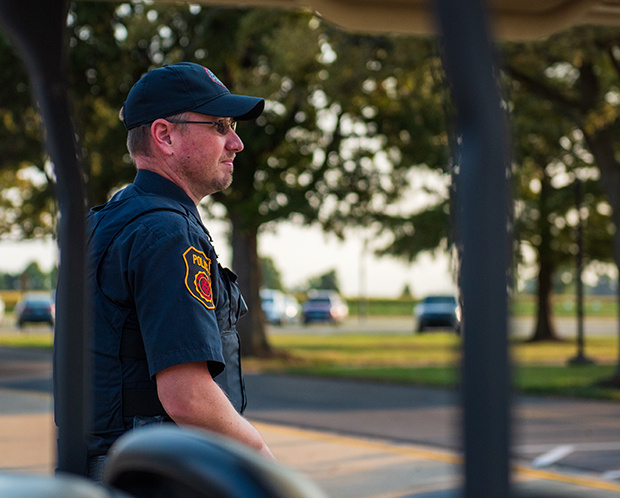
Campus Services
Dead Car Battery?
Keys Locked in Your Vehicle?
Lost & Found
Parking
Vehicles must be parked inside the lines of the parking space.
Vehicles parked over the line take up two parking spaces. This causes a shortage of parking for others.
Vehicles parked over the line increase the chance of being hit by another vehicle entering or leaving the space beside you.
Unauthorized parking in restricted spaces will result in a parking ticket.
The fine for unauthorized parking in a handicapped space is $250.
Patrol
We constantly patrol the campus, speaking with faculty, staff and students to promote communication and obtain information which we use to help maintain a safe campus environment. Our patrols are a proactive measure to reduce the likelihood of rule and law violations. We respond to emergencies of all kinds.
We watch for strange behavior which may indicate:
- Violations of campus rules and laws
- Persons needing medical attention
- A sexual predator
- A person with an order of protection against him / her
- Other potential problems
We monitor the open computer lab in the LRC to assist staff in enforcing rules and to keep the LRC quiet for study.
What do I do in an emergency?
Emergency Procedures
Personal Preparedness Checklist
- Know your location and evacuation routes.
- Know where fire extinguishers, emergency exits, emergency telephones and pull alarms are for your area.
- Know where the First Aid Kit is located.
- Keep (618) 437-5321 ext 1911 handy - the telephone number for Campus Emergencies. Program the number into your cell phone.
- Follow instructions given to you from a trusted faculty, staff or law enforcement representative.
- Keep identification on you at all times.
- If you do not speak English, prepare an emergency card with your name, addresses and information about medicines and allergies. Keep on you at all times.
- Remember the details of an event.
- Learn where the emergency campus assembly area is located.
- Learn first aid and CPR.
After an Emergency:
- Notify your relatives that you are safe, but do not tie up telephone lines that may be needed for emergency calls.
- Use caution in entering a damaged building.
- Move to a safe and secure place once it is safe to do so.
- Stay away from damaged electrical wires and wet equipment.
- Monitor local television and computer displays and listen for alerts.
- Check food and water supplies for contamination before consuming.
- Check the web at rlc.edu for updated information.
- Stay calm and take time to think. Give assistance where needed.
- If ordered to evacuate, take your emergency kit, personal belongings (if possible) and follow official directions to a safe place.
- Use telephones for emergency calls only.
Emergency Kit:
- Water and a nonperishable or easy open canned snack
- Small First Aid Kit
- Flashlight with extra batteries
- Special medications and specialty items (pain relievers, walking cane, hearing aid battery, etc.)
- Cash
- Medical alert and emergency contact information
Remember, relief workers cannot reach everyone right away. Prepare before an emergency occurs.
Tips for People with Special Accommodations
GENERAL TIPS:
- Discuss your emergency plans with your faculty or advisor.
- Find a buddy who could walk with you to assist you if other means of transportation are unavailable.
- Notify Campus Police to add you to a list of those with special needs.
- Keep a list of people who can help and their telephone numbers.
- Visit Disability 911 for tips and tools for disaster preparedness
- Emergency 2.0 Wiki Accessibility Toolkit
- Prepare for Cold Weather
People with Visual Disabilities
- If you use a cane, keep a spare cane with you to help you maneuver around obstacles and hazards.
- Service animals may become confused, panicked, frightened or disoriented during and after an emergency. Keep them securely leashed, harnessed or confined. Be prepared to use alternate ways to negotiate your environment.
- Ask to have the television and displays of news announced slowly and repeated frequently for those who cannot read the screen.
People with Hearing Disabilities
- If possible, have extra batteries for hearing aids and implants, and light phone signaler available.
- Determine how you will communicate with emergency personnel if there is no interpreter or if you do not have your hearing aids. Keep paper and pens on you for this purpose.
- Consider carrying a pre-printed copy of important messages with you, such as “I speak American Sign Language (ASL) and need an ASL interpreter. I do not write or read English.”
People with Mobility Disabilities
- Store needed mobility aids (canes, crutches, walkers, wheel chairs) close to you.
- Keep a pair of heavy gloves with you to use while wheeling or making your way over glass or debris.
- If you use a motorized wheelchair or scooter, consider having an extra battery available.
- If your chair does not have puncture proof tires, keep a patch kit or can of “seal-in-air product” for repairs.
- If you spend time above the first floor of a building, plan and practice using alternative methods of evacuation. Enlist the help of a buddy.
- If you cannot use stairs, discuss lifting and carrying techniques that work for you.
- It is important to discuss the safest way to transport you if you need to be carried, alert helpers of any areas of vulnerability.
People with Medical Needs
- Maintain a list of all of your medications: name of medication, dose, frequency and the name of the prescribing doctor.
- Keep an extra day supply of any medical supplies you need.
- If you use oxygen, maintain an emergency supply (enough for at least a day).
- Keep an emergency bag packed at all times that contains your medication list, medical supplies, and copies of vital medical papers.
Helping Children on Campus
- Stress safety in damaged areas, i.e., nails, power wires, snakes, etc.
- Talk with children about how they are feeling. Assure them that it is OK to have those feelings.
- Children should not be expected to be brave or tough. Tell them it is OK to cry.
- Do NOT give children more information than they need or can handle about an emergency event.
- Assure fearful children you will be there to care for them until other help arrives.
- Reassure children that the disaster was not their fault.
- Re-establish contact with extended family as soon as it is safe to do so.
- For more tips to help children, go to http://www.ready.gov/
Weather Emergencies
- Winter Weather
- Floods
- Tornadoes / Severe Thunderstorms
- Power Outage
- Evacuation
Register for WENS updates to receive text and email notifications during severe weather.
Severe Weather
Severe weather is any weather that can pose a threat to life and property. The information provided is to give the LSCS community information on how to handle potential severe weather events while visiting one of our campuses.
If severe weather threatens, you should:
- Follow instructions as provided by your manager and/or review the information provided on this site
- Listen to the radio and television for weather updates, and
- Check with your manager or local media for return-to-work status.
Where to get local weather conditions:
Local media outlets will provide updates and information on severe weather. Additionally, RLC officials will update our website at rlc.edu and will notify local media outlets regarding closings and return-to-work situations.
Television (cable/satellite channels may vary)
- KTVI Fox 2
- WSIL TV 3
- KMOV 4
- KSDK 5
- WPSD TV
- KFVS 12
Radio
- WOOZ 99.9 FM Radio
- WDDD-FM 107.3 FM Radio
- WMIX 94 AM & FM Radio
- WDML 106.9 FM Radio
Online Support Links
Crime
Crime on Campus:
RLC policies prohibit disruption and obstruction of RLC functions and activities, verbal threats and behavior endangering the health or safety of any individual.
View RLC's Annual Security Report Here.
Disruptive behavior interferes with the educational environment or prevents normal work functions or activities. Examples include yelling, using profanity or refusing reasonable requests for identification.
Threatening behavior includes physical actions short of actual contact or injury (e.g., moving closer aggressively), or oral or written threats to people or property (“I’ll get you,” “I’ll break it”), or implicit threats (“this isn’t over”).
Violent behavior includes any physical assault, with or without weapons; behavior a reasonable person would interpret as being potentially violent (e.g., throwing things, pounding on a desk or door) or specific threats to inflict physical harm (e.g., a threat to shoot someone).
You should report immediately when an individual is:
- Engaging in persistent, obsessive attention to others
- Intimidating, verbally abusing, harassing or mistreating others
- Engaging in stalking behavior
- Making threatening references to other incidents of violence
- Making threats to harm self, others or property
- Detailing specific proposed act(s) of disruption or violence
- Expressing feelings of revenge, or being wronged, humiliated or degraded.
If you feel threatened or in danger you should:
- Find a way to excuse yourself; leave the room or area and get help.
- Not mention the police if you fear an angry or violent response.
- Signal for assistance.
- Do NOT isolate yourself with an individual you believe may be dangerous. Maintain a safe distance, do not turn your back and stay seated, if possible. Leave a door open, open a closed door or sit near the door.
- NEVER try to remove them from the area. An agitated individual who may respond with violence towards you may interpret even a gentle push or grabbing an arm as an assault.
Report all disruptive, threatening, or violent behavior to RLC Police at ext 1911 or 618-525-1911 at any time or other campus representatives.
Be prepared to answer:
- Type of emergency
- Your telephone number
- Your name
- Your location and the location of the emergency (if different)
- A description of individuals, if applicable
- A description of vehicles, if applicable
- The responding person will discuss the course of action. If necessary, a follow-up will be conducted later.
- The RLC Chief of Police will review all reports of campus violence for possible follow-up by the Campus Threat Assessment Team.
Crime prevention: ensuring the safety of the RLC community is a group effort – we all must do our part. Be informed and get involved.
When working, visiting or attending classes on campus, keep in mind the following:
Report any suspicious persons or activities to the Police Department ext 1911 or 618-525-1911.
- Do not prop open entrances to buildings or rooms.
- Clear your desk and computer of sensitive information and lock your work areas every time you leave.
- Report all maintenance problems to your campus Facilities.
- Use the escort services rather than walk alone at night.
- Be mindful of your surroundings.
- Report lost keys and access cards immediately.
Important Things That Can be Done to Reduce the Effects of an Emergency:
- Make sure you have a support system in place. Create a “buddy system” that can help you prepare for a disaster, as well as during and after a disaster. Members of your support system, or “buddies”, can be classmates, staff, faculty, friends and co-workers. They should be people you trust to determine if you need assistance. Your support-system members should know your capabilities and needs, and be able to help in a matter of minutes.
- Prepare your individual emergency plan. Create an emergency contact list (contact information for your doctors, emergency out-of-town contacts and your support system) and a medical information list (name of medical provider, list of medications, allergies and copies of health insurance card). Keep this information handy.
- Gather the supplies you will need before, during and after an emergency. Your emergency supply kit should also include supplies specific to your disability (writing or hearing devices, additional medication, wheelchair, walker, etc.).
- Make sure your area is as safe as possible in the event of an emergency. One of the best ways to avoid possible injuries and stay safe, is to prepare your work area while on campus before an emergency (move furniture or other items that may block your escape route, keep a small flashlight near you in case of power outage and know where your personal belongings are at all times).
Reminder to Students and Faculty:
- DO NOT go to the campus unless told it is okay by school officials after an emergency. If you go to the campus, you may be putting yourself and others in danger. DO check your local TV or radio station, on the Internet at rlc.edu, or by calling 618-437-5321. If there is an emergency, the phone lines may become busy or needed for official business.
- DO listen and watch for announcement when on campus to ensure it is safe to move around.
BE READY!
Knowing what to do protects you and your family!
AEDs
Knowing how to use these devices and where they are located can increase the survival rate of a heart attack. Locations of these devices are denoted in the campus Fire Safety Plan and on the evacuation maps posted around campus. You may also contact your campus Facilities Department for more information.
Frequently Asked Questions
How do you use an AED?
Watch this five-minute video “How to Use an AED” for instructions.
What should I do when needing to use an AED?
If an AED is activated notify emergency personnel immediately by calling 9-1-1 (cell phone or off-campus) or 1911 (from a campus phone).
Is a key needed to access or use the AED machine?
No.
Are there instructions on how to use the AED?
Printed instructions and graphics are on the machine. Some AEDs have voice prompts to guide the user. View the video above for additional instructions. If not an emergency, we recommend you obtain training by using the information above.
Shelter in Place
- Go inside and stay calm.
- Close all doors, windows and other sources of outside air.
- Go into a room with the fewest doors and windows and seal the room.
- Air conditioning and heating systems will be turned off to keep chemical vapors from entering.
- Ceiling or rotary fans inside the building may be used safely to keep cool.
- Limit telephone use for emergency calls only. Overloaded telephone circuits may keep actual emergency calls from getting through.
- Listen for authorities to tell you when it is safe to come out. Tune in to your local emergency radio or television station. For RLC information listen for an announcement over the public address system, monitor computer and visual displays or await word from local officials.
Please Contact the Campus Police at ext. 1911 from a campus phone, or 618-525-1911 from an off-campus phone for police emergencies.
Epidemics & Campus Health
Respiratory infections such as colds, coughs and the flu, affect the nose, throat and lungs. The germs (viruses and bacteria) that can cause these infections are spread person-to-person in the air or by physical contact. Tips to help prevent spreading germs or avoiding catching someone else's germs include:
Keep your germs to yourself:
- Cover your nose and mouth with a tissue or your arm.
- Throw out used tissues in the trash as soon as you can.
- Always wash your hands after sneezing, blowing your nose, coughing or after touching used tissues or handkerchiefs. Also wash often if you are sick.
- Use warm water and soap or alcohol-based hand sanitizers to wash your hands.
- Try to stay home if you have a cough or fever.
- See your doctor as soon as you can if you are feeling ill and follow their instructions.
- Do NOT share personal items, such as towels, lipstick or anything that may be contaminated with respiratory germs.
- Do NOT share food, utensils or beverage containers with others.
- Keep your immunizations current.
Building Explosion
Know the campus emergency evacuation procedures.
Look for the Emergency Handbooks located in every building on campus next to the evacuation maps.
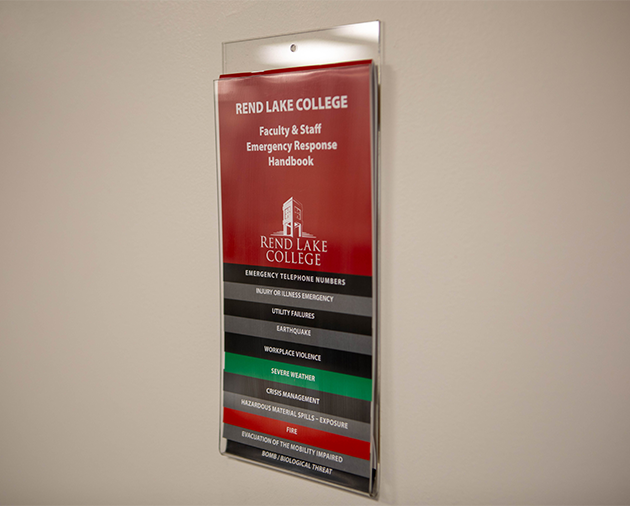
Know where the fire exits, and fire extinguishers are located and be able to find them in the dark.
Stay away from windows.
Immediately get under a sturdy table or desk if things are falling around you.
Stay below any smoke at all times.
If trapped in debris:
- Use a flashlight, if available to help rescuers locate you.
- Stay in your area so you do not kick up dust.
- Cover your mouth with your clothing or a handkerchief.
- Tap on a pipe or wall so that rescuers can locate you. Shout as a last resort – shouting can cause a person to inhale dangerous amounts of dusts.
If a fire occurs:
- Stay low to the floor and exit the building quickly and calmly.
- Cover your nose and mouth with a wet cloth.
- Test closed doors for heat with the palm of your hand and forearm on the lower and upper portions of the door. If it is hot or warm to the touch, do not open. Seek an alternate escape route.
- Never use water on an electrical fire.
- If caught in smoke – drop to your hands and knees and crawl; breathe shallowly through your nose and use your clothing as a filter.
- If you must move through flames – hold your breath, move quickly, cover your head and hair, keep your head down and close your eyes as much as possible.
- If your clothes catch fire “stop, drop and roll” until the fire is out.
- If you are in a room and cannot escape, leave the door closed, stay low to the floor and hang a white or light-colored cloth outside the window.
Bomb Threats
What to Do When a Bomb Threat Occurs:
- If you receive a bomb threat, get as much information from the caller as possible.
- Be aware of background noise, special voice characteristic, music, machinery, etc.
- Call (618) 437-5321 ext. 1911 or (618) 525-1911 immediately.
- If you receive a bomb threat, do not touch any suspicious packages.
- Clear the area around the suspicious package and notify police immediately.
- When evacuating a building, avoid standing in front of windows or other potentially hazardous areas.
- Do not restrict sidewalks or other areas used by emergency officials.
- If you find a bomb, do not touch it or attempt to move it. Call for help and evacuate the area.
Terrorism
- Be aware of your surroundings; do not let fear overwhelm you.
- If you see what appears to be a dangerous situation, call ext 1911 or (618) 525-1911 and explain your concerns to the Campus Police Officer. The Officer will help determine what actions should be taken.
- Be aware of conspicuous or unusual behavior. Do not accept packages or backpacks from strangers. Do not leave your personal belongings unattended.
- Learn where emergency exits are located and how to quickly evacuate a building or congested public area.
- Stay clear of heavy or breakable objects that could move, fall or break in an explosion.
- If something occurs, seek safety immediately and listen for campus alerts that will provide you with information and precautions you need to take.
If you receive a ticket:

In Case of an Emergency
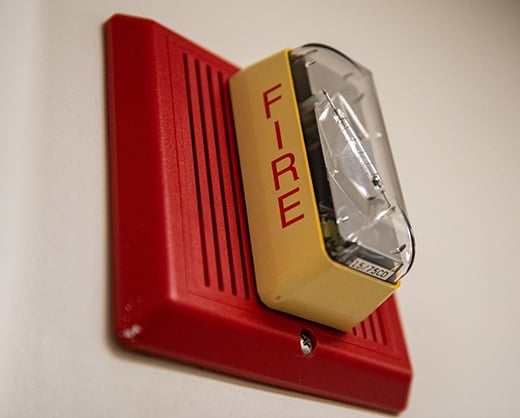
Emergency Alarms
Fire Alarms:
In case of fire, a loud alarm will sound and strobe lights will flash to warn you to leave the building.
Severe Weather:
In a tornado / severe weather emergency, the outside siren will sound and the Informacast phone system will advise you to seek shelter. Drills are conducted regularly.
RLCalert:
Sign up today for Rend Lake College's Wireless Emergency Notification System. WENS gets you fast text updates about weather-related closing and emergencies on campus. Sign up for this free service at www.rlc.edu/wens
*Standard text-messaging rates may apply*
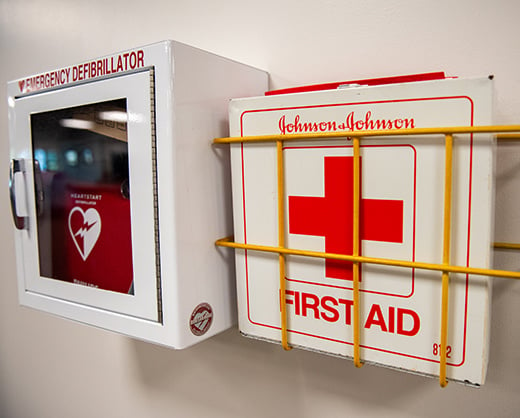
First Aid
First aid given promptly and effectively can save lives. Often, it can assist in the prevention of minor injuries deteriorating into serious injuries. In many incidents or accidents, it could be the only treatment necessary, such as in the case of a minor cut or abrasion.
Call ext. 1911 or (618) 525-1911 for first aid.
If you witness a medical emergency:
Call ext. 1911 or (618) 525-1911
Give as much information as you can:
Time, place, what happened, number involved, etc.
Stay at the site until help arrives.
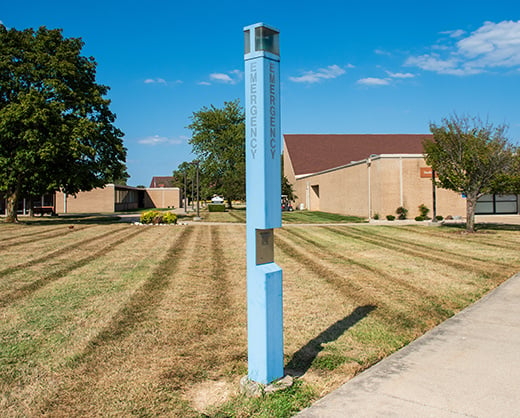
Blue Emergency Phones
Emergency blue phones are located throughout the campus.
1. Push round button on the phone panel.
2. Listen for the announcement.
3. Security staff will answer the call.
4. Talk into the speaker and give all the information you can regarding the emergency.
Blue Emergency Phone Locations:
- Learning Resource Center
- Student Center
- Vocational Building
- RLC Foundation Children's Center
- Science Building
- Baseball/Softball Fields Concession Stand
- James "Hummer" Waugh Gymnasium
- Mark S. Kern Applied Science Center
- Warrior Way (under the Academic Building overpass)
- Coal Mining Training Center
There are also emergency phones in the LRC and ACA elevators
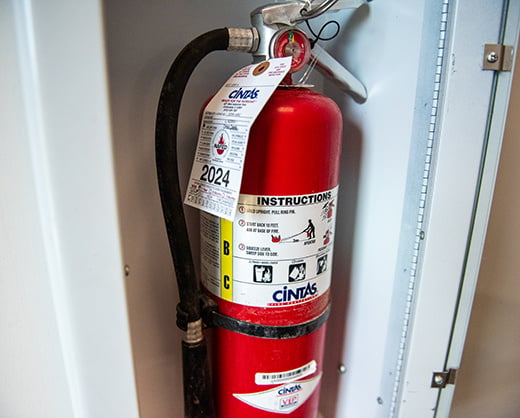
Inspections
We conduct regular monthly and on-going inspections of:- Fire extinguishers
- Emergency phones
- Wheelchair lifts
- Automatic doors
- First aid stations
- Eye wash stations
- Exterior lighting (as well as other equipment to help promote safety.)
We conduct a monthly school safety audit to address unsafe conditions.
Emergency Alarms
Fire Alarms:
In case of fire, a loud alarm will sound and strobe lights will flash to warn you to leave the building.
Severe Weather:
In a tornado / severe weather emergency, the outside siren will sound and the Informacast phone system will advise you to seek shelter. Drills are conducted regularly.
RLCalert:
Sign up today for Rend Lake College's Wireless Emergency Notification System. WENS gets you fast text updates about weather-related closing and emergencies on campus. Sign up for this free service at www.rlc.edu/wens
*Standard text-messaging rates may apply*

First Aid
First aid given promptly and effectively can save lives. Often, it can assist in the prevention of minor injuries deteriorating into serious injuries. In many incidents or accidents, it could be the only treatment necessary, such as in the case of a minor cut or abrasion.
Call ext. 1911 or (618) 525-1911 for first aid.
If you witness a medical emergency:
Call ext. 1911 or (618) 525-1911
Give as much information as you can:
Time, place, what happened, number involved, etc.
Stay at the site until help arrives.

Blue Emergency Phones
Emergency blue phones are located throughout the campus.
1. Push round button on the phone panel.
2. Listen for the announcement.
3. Security staff will answer the call.
4. Talk into the speaker and give all the information you can regarding the emergency.
Blue Emergency Phone Locations:
- Learning Resource Center
- Student Center
- Vocational Building
- RLC Foundation Children's Center
- Science Building
- Baseball/Softball Fields Concession Stand
- James "Hummer" Waugh Gymnasium
- Mark S. Kern Applied Science Center
- Warrior Way (under the Academic Building overpass)
- Coal Mining Training Center
There are also emergency phones in the LRC and ACA elevators

Inspections
We conduct regular monthly and on-going inspections of:- Fire extinguishers
- Emergency phones
- Wheelchair lifts
- Automatic doors
- First aid stations
- Eye wash stations
- Exterior lighting (as well as other equipment to help promote safety.)
We conduct a monthly school safety audit to address unsafe conditions.

Helpful Safety Tips
1. Always lock your vehicle on campus.
2. Record the make, model and serial numbers of all valuable items in your vehicle.
3. Do not leave personal belongings unattended.
4. Report missing items as soon as possible.
5. Walk to the parking lot with your keys in your hand.
6. If you arrive on campus after hours, on holidays/weekends or for an unscheduled event, please advise the security office when you arrive or leave.
